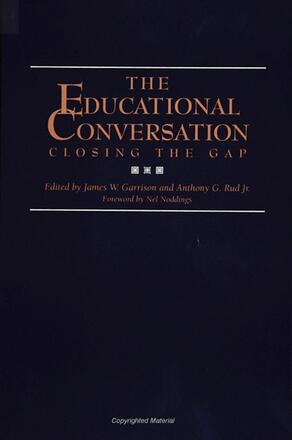
The Educational Conversation
Closing the Gap
Alternative formats available from:
This book discusses topics normally excluded from the current educational conversation such as soul, authority, irony, memory, style, luck, privacy, power, and hospitality.
Description
This book brings together a distinguished group of philosophers of education dealing with important thought often neglected: ideas and concerns in teaching, learning, and teacher education. The authors engage in an extended discussion of the moral dimensions of teaching that leads in a fresh direction, distinct though related, to the important work of Goodlad and others in recent years. Nel Noddings's foreword places the book firmly in current debates about teaching and learning, particularly stressing its importance to teacher education in difficult times. Contributors include Nicholas C. Burbules, Sophie Haroutunian-Gordon, James W. Garrison, Anthony G. Rud, Jr., Shirley Pendlebury, Alven Neiman, Leonark Waks, C. J. B. Macmillan, and Daniel P. Liston.
James W. Garrison is Professor in the Department of Curriculum and Instruction, College of Education, Virginia Polytechnic Institute and State University. Anthony G. Rud, Jr. is Associate Dean in the School of Education at Purdue University.
Reviews
"This is a timely and well-written contribution to a growing body of literature in education that emphasizes the moral as distinct from the 'performance evaluation' and other 'standardized' procedures for testing teachers and 'measuring' their work. Certain chapters, such as the ones discussing the tragic dimension of teaching, irony, style, luck, and soul, present a diversity of ways in which the moral dimension of teaching may be addressed; and they discuss these ideas in a compelling way." -- J. J. Chambliss, Rutgers University
"This is a collection of engaging, thought-provoking, well written pieces that provides a welcome counterweight to most of what's being written on teaching in scholarly circles today. The works avoid both the narrowly technical formulations of much mainstream research on teaching, and the kinds of ideologically freighted discourse that often serves as an alternative to it. In so doing, they invite rethinking and reflection on teaching." -- Paul Farber, Western Michigan University